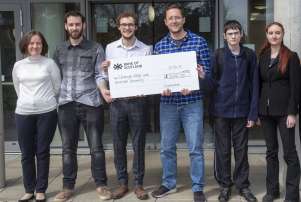Digital skills partnership pilot programme takes radical new approach to delivering work-ready tech talent

A pioneering pilot programme that takes positive action to address the skills gap in Scotland’s expanding digital technologies industry by delivering work-ready tech talent has been completed.
The Digital Skills Partnership, a ScotlandIS initiative supported by Skills Development Scotland and the Scottish Funding Council, developed the pilot initiative to improve collaboration between industry and academia. It seeks to give students experience of real-world challenges in the software development process by bringing together learners with different levels of experience and expertise in small teams to respond to an industry-style brief with very specific deliverables.
Another aspect of the project is to provide college students with support so that they can move on to university more seamlessly, helping to acquaint them with the university environment before they make the move from college.
The pilot programme saw five teams of five students from around Scotland pitted against each other for the chance to gain valuable experience and also to win a team prize of £1,000,(€1165) kindly donated by Craneware plc:
- Robert Gordon University and North East Scotland College
- Heriot-Watt University and Edinburgh College (two teams)
- University of Stirling and Forth Valley College and
- University of the West of Scotland and City of Glasgow College.
Each team received the brief at the end of January and was paired with an academic lead and an industry mentor from either CAS Ltd or CGI UK. The ultimate winners were named as Maxime Greffe, Bartosz Kubera and Charles Spence from Edinburgh College and Rory Dobson from Heriot-Watt University after the final presentations were completed.
Lesley Broadwood, project development manager at ScotlandIS, says: “It has been great to see how well the pilot has gone for everyone involved. This ground breaking initiative is aimed specifically at making sure our tech graduates are as well-equipped as possible to hit the ground running when they join the workforce and this mixed experience level project will help prepare them in a more realistic way for the software development process in industry. The success from this pilot will help us to roll the programme out at the start of the next academic year.”
Joanna Campbell, chair of the Digital Skills Partnership and vice principal Student Experience at the City of Glasgow College, comments: “It was fantastic to see the level of interest and engagement we had from students during this programme. The students who got involved were most keen to improve teamworking skills and viewed the Digital Skills Partnership programme as an opportunity to gain industry knowledge, broaden their hands-on experience and enjoy new networking opportunities. It also provided college students with a warm introduction to the university environment, hopefully making the transition from college to university less daunting and therefore enhancing their career path. A great example of work to widen access and improve the life chances of our future workforce.

Adam Dallis
“The true benefit of the programme is that it offers students an insight that goes beyond what can be taught in a classroom, through responding to a live brief with a multi-skilled team and access to real-world tools. This helps contextualise the learning and illustrate how their tertiary education will translate into the workplace.”
Industry leaders were involved throughout the development and implementation of the Digital Skills Partnership project. They were crucial in informing the type of brief the students received and sharing feedback on the skills that are critical to talent joining the Scotland’s tech workforce.
Adam Dallis, Software Team Lead at Craneware plc said: “We’re delighted to support this innovative project. As a major employer of software specialists we know how important it is to help young developers to build their team skills and understand the real world application of all the theory they learn about in college and at university.”
Chris Ellis, chief technical officer at CAS Ltd, adds: “The Scottish tech sector is always in need of fresh new talent and it is imperative that students are skilled not only technically but have the ability to interpret a brief and work as a team with varying backgrounds to deliver a strong response. The Digital Skills Partnership initiative bridges the gap between hard, technical skills and soft skills like problem-solving, communication and collaboration that are all equally important when putting technical knowledge into real-world practice.
“All the teams delivered impressive responses to the brief. It was difficult to determine an outright winner. However, what was delivered by students from Edinburgh College and Heriot-Watt University raised the bar higher than the others so they were the deserving winners of the initial pilot. That said – I’d say everyone involved has much to be proud of. It will be great to see this scheme rolled out further and see the results of more rounded work-ready recruits filtering through to the benefit of this dynamic and exciting industry in Scotland.”
Comment on this article below or via Twitter @IoTGN
